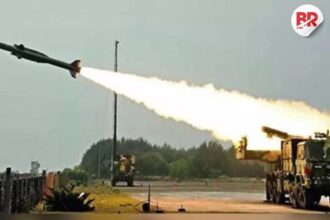
In a charged interview with Sky News, Pakistan’s Bilawal Bhutto Zardari condemned India for what he called an “unprovoked and deliberate” act of aggression in Kashmir.
The former Foreign Minister and current political heavyweight expressed condolences for the “martyred” Pakistani Terrorists, even as he claimed the Pakistan Air Force had shot down five Indian aircraft in response.

Where is the evidence?
Bhutto also repeated Pakistan’s long-standing line that its “hands are clean” and that it has “time and time again offered impartial investigations” into cross-border allegations.
He stressed that if India had “nothing to hide,” it would welcome an independent inquiry, particularly in the disputed region of what he repeatedly called “Indian-occupied Kashmir.”
But the statement raised eyebrows across South Asia and among international observers. This is the same Bhutto who, not long ago, publicly stated that “Pakistan has a history of terrorism.”
Speaking on live TV following the assassination of his mother, former Prime Minister Benazir Bhutto, he had once emotionally condemned terrorism, calling out its roots and legacy in his homeland.
Even more controversially, Bhutto is also remembered for his fiery rhetoric in front of thousands during a political rally where he declared: “Either the river will flow, or it will be filled with blood.”
“Either Water will flow in Indus or blood of Indians” – BILAWAL BHUTTO
pic.twitter.com/nXmK9byqDT— BALA (@erbmjha) April 25, 2025
His critics say these latest remarks only reinforce his image as a populist trying to balance international diplomacy with domestic muscle-flexing.
During the Sky News interview, Bhutto dismissed reports of the Mashood family killings, which have circulated on Pakistani social media, as “fake news.”
He claimed the Indian narrative around those killings was fabricated to “divert attention” from what he alleged were India’s own escalatory actions.
Pakistan, he said, is calling for calm and “an impartial enquiry” into recent border escalations. “India has endangered regional peace,” Bhutto warned, adding that “Pakistan reserves the right to respond to aggression.”
Yet Bhutto’s remarks left a trail of contradictions.
As someone who has personally suffered from terrorism—and has openly called out Pakistan’s internal challenges with extremism—his aggressive posture and denial of any Pakistani involvement in recent escalations struck many as political theatre.
Pakistan can keep its theatre of denial, but history shows: nations built on lies don’t last. India will keep defending itself—with force when necessary—while Pakistan’s leaders keep blaming others for their self-made crises.
The world is watching. And the world knows who the real terrorists are.
Also Read What are Loitering Munitions? Pakistan Never Saw These Drones Coming












